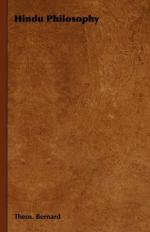|
This section contains 2,706 words (approx. 10 pages at 300 words per page) |

|
The human phenomenological experience of the universe consists fundamentally of the self or subject encountering a world of objects. Thus the two main objects of philosophy are the subject or the self—its nature and constitution—on the one hand, and the universe, along with its nature and constitution, on the other. Indian philosophy is no exception to this rule.
This experiencing self is referred to by several terms in Indian philosophy, the one most widely used being ātman. The word is usually derived from the root an, which means "to breathe"; apparently the fact that the perceiving self is an animate being who faces other animate beings and inanimate objects is central to its emergence as the marker of the self. It is called purua when its distinction from inanimate nature or prakti is emphasized, and it is called jīva...
|
This section contains 2,706 words (approx. 10 pages at 300 words per page) |

|


